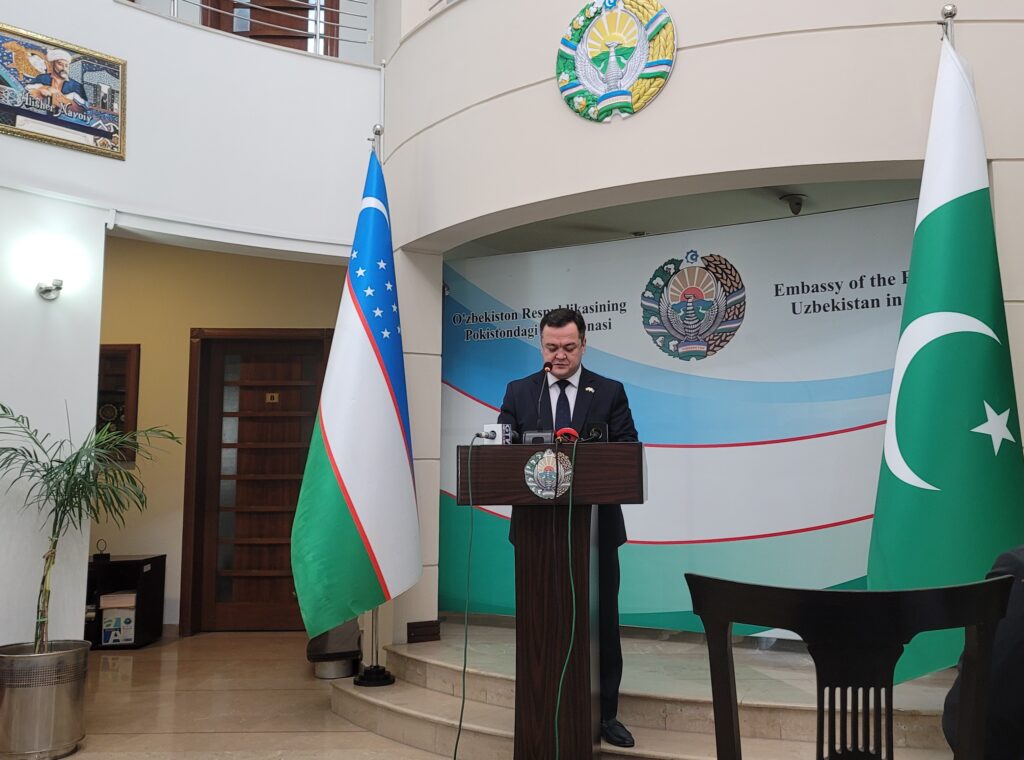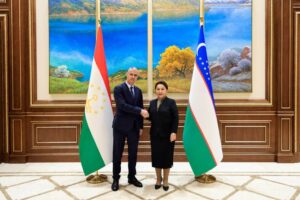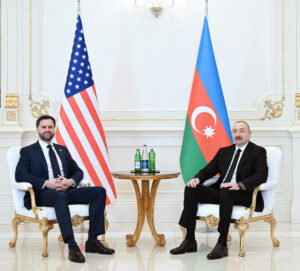H.E. Alisher Tukhtaev Media Briefing Session at Embassy of Uzbekistan, Islamabad

Assalomu alaykum va rahmatullahi va barakatuh,
Dear friends, Ladies and gentlemen,
First of all, I would like to warmly welcome all of you to the Embassy of Uzbekistan today. It is a great honour for us to host such a distinguished gathering of representatives from Pakistan’s leading media, television, radio, and news agencies at this Media
Briefing Session.
The main purpose of today’s session is to provide you – and through you, the broader Pakistani public – with an update on the current state and future prospects of the multifaceted bilateral relations between Uzbekistan and Pakistan.
Over the past few years, the relations between Uzbekistan and Pakistan have witnessed dynamic progress, thanks to the strong political will and mutual understanding demonstrated by the leadership of both countries.
Our partnership is based on shared history, culture, religion, and mutual respect – and we are committed to deepening our cooperation across political, economic, trade, investment, transport, education, tourism, and people-to-people areas.
Today, I would like to briefly highlight some key developments and upcoming initiatives in our bilateral relations:
1. High-Level Political Dialogue
The frequency of high-level visits and meetings is a clear sign of the growing trust and strategic nature of our relations. The recent exchanges between our leaders and ministers have laid a strong foundation for practical cooperation and tangible outcomes.
As you are aware, the Honorable Prime Minister of Pakistan, His Excellency Mr. Shehbaz Sharif, paid an official two-day visit to Uzbekistan on 25–26 February this year.
This high-level visit marked a significant milestone in our bilateral relations and reflected the shared commitment of both governments to further strengthen cooperation in all spheres.
During the visit, both sides held comprehensive discussions on a wide range of issues, including political dialogue, regional connectivity, trade and economic relations, energy, agriculture, and joint infrastructure projects. Several important agreements and Memorandums of Understanding were signed, laying the groundwork for deeper institutional collaboration.
Particularly, the President of the Republic of Uzbekistan, His Excellency Shavkat Mirziyoyev, and the Prime Minister of the Islamic Republic of Pakistan, His Excellency Shehbaz Sharif, signed a Joint Declaration and a Protocol on the Establishment of a Strategic Partnership Council at the highest level.
This landmark step reflects the shared vision of our two leaders to elevate Uzbek-Pakistani relations to a new strategic level and to institutionalize a comprehensive framework for long-term, multifaceted cooperation.
The following important documents were also signed and exchanged in the presence of the two leaders:
a. Agreement on cooperation in the field of science, technology and innovations;
b. Agreement on visa-free travels of holders of diplomatic passports;
c. Agreement on cooperation between the Ministries of Interior;
d. Agreement on cooperation in the field of vocational education;
e. Agreement on cooperation in the field of youth policy;
f. Agreement on cooperation between national information agencies;
g. Cooperation agreements and arrangements between diplomatic academies, the cities of Tashkent and Lahore, and other documents.
As a result of the summit talks, a mutual decision was made to develop and approve a joint “Roadmap” to ensure the timely, coordinated, and effective implementation of all the agreements and documents signed during the visit.
Of particular note was the mutual commitment to accelerate the implementation of the Trans-Afghan railway project, aimed at connecting Uzbekistan, Afghanistan, and Pakistan – which would open up enormous opportunities for regional trade and integration.
In addition to official visits, our leaders have met regularly on the sidelines of major international events, further reaffirming their shared commitment to strengthening bilateral relations and regional cooperation.
Most recently, on July 4, on the margins of the Economic Cooperation Organization (ECO) Summit in the city of Khankendi, a meeting took place between the President of the Republic of Uzbekistan and the Prime Minister of the Islamic Republic of Pakistan.
During the meeting, the two leaders discussed topical issues related to the further expansion and deepening of Uzbek-Pakistani strategic partnership, with a particular focus on the effective implementation of the jointly adopted “Roadmap.”
On 7thApril within the framework of the 150thAnniversary Assembly of the Inter-Parliamentary Union, the President of the Republic of Uzbekistan held a meeting with a delegation from the Islamic Republic of Pakistan, headed by the Chairman of the Senate, His Excellency Yusuf Raza Gilani.
During the meeting, special attention was given to the growing role of parliamentary diplomacy in supporting and ensuring the effective implementation of the agreements reached during the high-level visit to Uzbekistan.
In addition to high-level meetings between our leaders, several interministerial and interagency meetings have also taken place, reflecting the growing institutional dialogue and practical engagement between Uzbekistan and Pakistan.
During the 51st Session of the Council of Foreign Ministers of the Organization of Islamic Cooperation (OIC), held in Istanbul on 21 June 2025, the Minister of Foreign Affairs of the Republic of Uzbekistan, Mr. Bakhtiyor Saidov, and the Deputy Prime Minister, Minister of Foreign Affairs, and Senator of the Islamic Republic of Pakistan, Mr. Mohammad Ishaq Dar, signed a Joint Action Plan aimed at accelerating the implementation of agreements reached during the official visit of the Prime Minister of Pakistan to Uzbekistan.
Furthermore, on 17 July 2025, a significant step was taken toward advancing regional connectivity. In Kabul, the Minister of Transport of Uzbekistan, Mr. Ilkhom Mahkamov, the Minister of Railways of Pakistan, Mr. Hanif Abbasi, and the Minister of Public Works of Afghanistan, Alhaj Mullah Abdulmanan Omari, jointly signed a Framework Agreement on conducting a Joint Feasibility Study for the Uzbekistan–Afghanistan–Pakistan (UAP) Railway Project.
This trilateral agreement marks a crucial milestone in the realization of the Trans-Afghan railway corridor, a strategic initiative aimed at enhancing trade, transit, and regional integration across Central and South Asia.
2. Trade and Economic Cooperation
Dear friends,
As the trade and economic sphere serves as a key and fundamental pillar of Uzbek-Pakistani relations, allow me to provide you with a brief update on recent developments and achievements in this area.
In 2024, Uzbekistan’s GDP reached $115.6 billion, with foreign trade turnover amounting to $65.9 billion,foreign direct investment totaling $34.8 billion, and foreign reserves standing at $41.1 billion, while inflation was recorded at 8.8% and the unemployment rate at 6.1%.
Over the past year, we have witnessed a steady and encouraging increase in bilateral trade turnover, with both sides making concerted efforts to diversify the range of traded goods and enhance direct business-to-business engagement.
In 2024, the total trade turnover betweenUzbekistan and Pakistan exceeded 400 million USD, and the number of joint ventures operating in Uzbekistan with Pakistani investments reached 130.
In the first half of 2025 alone, mutual trade amounted to 253.7 million USD, representing a remarkable 123% growth compared to the same period in 2024.
As a result of this positive momentum, Uzbekistan has now become Pakistan’s largest trading partner in Central Asia – a clear reflection of the growing depth, trust, and mutual benefit in our economic partnership.
However, these trade figures still fall far short of our true potential. As emphasized by our leaders, both sides are firmly committed to significantly expanding bilateral trade in the coming years.
We have set an ambitious but achievable target: to increase the volume of mutual trade to $2 billion in the near future. To achieve this, we must continue working together to eliminate remaining trade barriers, improve transport and logistics connectivity, simplify customs procedures, and foster even closer ties between our business communities.
In an effort to promote the bilateral trade three major exhibitions were successfully organized in Lahore, Islamabad, and Karachi.
The “Made in Uzbekistan – 2025” Industrial Exhibition was held in Lahore in February, showcasing products from 15 key sectors. Nearly 200 Uzbek entrepreneurs participated in more than 800 B2B and G2B meetings, resulting in trade and investment agreements worth $90 million with Pakistani business partners.
The “Food Fest Uzbekistan – 2025” took place in March at Centaurus Mall, Islamabad’s premier trade and exhibition venue. 25 Uzbek food manufacturers presented their products to a wide audience. The event drew over 200,000 visitors, including representatives from retail and distribution companies, trade networks, restaurants, and the general public. As a result, trade agreements exceeding $30 million were concluded.
The third exhibition under the “Made in Uzbekistan – 2025” banner, along with an accompanying business forum, was held on June in Karachi.
30 Uzbek producers from industries such as textiles, construction materials, leather footwear, agriculture, livestock, mineral fertilizers, and medical equipment took part. The event welcomed more than 300 entrepreneurs and concluded with trade and investment deals.
To further expand bilateral trade and diversify exports, Uzbekistan-Pakistan Trade Houses were opened in Lahore (February), and in Karachi (May).
In order to enhance mutual payment mechanisms with Pakistan, a delegation from the Central Bank of Uzbekistan, accompanied by representatives of leading Uzbek commercial banks, visited Karachi in April this year.
During the visit, in-depth discussions were held with State bank of Pakistan and major commercial banks – including Bank Al-Habib Limited, HBL, Meezan Bank, Habib Metropolitan Bank, UBL, Askari Bank, and Soneri Bank – focusing on settlement procedures in bilateral trade and export-import operations.
In parallel, both governments are working closely to finalize a Preferential Trade Agreement (PTA), which is expected to significantly reduce tariffs and simplify customs procedures for key commodities.
Our countries plan to increase the number of goods covered under the Preferential Trade Agreement from 17 to 100.
The leadership of Uzbekistan and Pakistan has also paid special attention to enhancing transport connectivity and fully utilizing the region’s transit potential. Although Uzbekistan currently has separate transit trade agreements with both Afghanistan and Pakistan, a proposal has been made to introduce a trilateral transit trade agreement to further facilitate regional trade. To increase cargo turnover, both sides have agreed to establish a joint transport and logistics company.
Furthermore, Uzbekistan intends to utilize the ports of Karachi and Gwadar as strategic gateways to global markets, aiming to enhance regional connectivity and ensure the smooth flow of goods to and from South Asia, the Middle East, and beyond.
All these initiatives will be discussed in greater detail during the upcoming meeting of the Uzbekistan-Pakistan Intergovernmental Commission, which is scheduled to take place later this year.
3. Cultural, Humanitarian Cooperation and Tourism
Dear friends,
It is a pleasure to address you today and to highlight the growing momentum in the cultural and humanitarian cooperation between the Republic of Uzbekistan and the Islamic Republic of Pakistan – particularly in the areas of tourism, science, education, and sports.
Over the past period, both countries have made consistent efforts to expand interaction in these spheres. Regular exchanges of delegations have taken place, and various initiatives have been launched to promote Uzbekistan’s rich tourism potential in Pakistan. A wide range of events – including meetings, briefings, roundtable discussions, and presentations – have been organized.
For the purpose of connecting our brotherly nations and strengthening people-to-people ties, Uzbekistan has eased its visa regime for Pakistani citizens.
Moreover, we have launched direct flights to further enhance connectivity. The second flight on the Tashkent–Lahore route commenced on April 2, while direct flights between Tashkent and Islamabad were inaugurated on June 14. These air links are expected to significantly boost mutual tourism, educational exchanges, business travel, and cultural cooperation, bringing our peoples even closer together.
Let me also share some key events, visits, and arrangements that have been undertaken to deepen cultural and humanitarian ties between our two countries. These include high-level cultural exchanges, academic collaborations, joint research initiatives, student exchange programs, and the organization of cultural days and exhibitions showcasing the rich heritage of Uzbekistan and Pakistan.
In October 2024, a high-level delegation from Pakistan’s National Assembly and the Office of the Prime Minister took part in the International Conference on Youth and Sports Policy held within the framework of the “International Cooperation Initiatives Week” in Uzbekistan.
In November 2024, Uzbekistan’s pavilion was prominently featured at the “Lok Mela” International Tourism and Culture Festival in Islamabad. Over the course of ten days, visitors were introduced to our country’s diverse tourism opportunities, as well as its historical, cultural, and scientific heritage.
In December 2024, as part of the “Charity Bazaar” held in Islamabad, an Uzbekistan Pavilion was established, presenting national attire, traditional cuisine, and a diverse collection of visual and applied arts. The exhibits garnered significant interest from the general public.
Additionally, toward the end of 2024, a grand cultural event was jointly organized with the “Silk Road Cultural Center” in Islamabad.
The event highlighted Uzbekistan’s tourism potential, rich tangible and intangible cultural heritage, centuries-old tradition of statehood, and unique customs and values. It was attended by senior officials of the Government of Pakistan, representatives of the tourism industry, media, and the broader public.
In February 2025, a delegation from Namangan State University visited Lahore and held promotional events under the slogan: “We are a nation with a great history, a great state, and a great culture.”
To further raise public awareness of Uzbekistan and to strengthen our country’s position in the Pakistani tourism market, in March this year, an exhibition was held at Islamabad’s largest trade and entertainment center – Centaurus Mall.
A cultural event dedicated to Nowruz was also organized at the Mariott Hotel Islamabad, featuring presentations on Uzbekistan’s history, culture, and tourism.
In April 2025, a delegation headed by the Chairman of the Uzbekistan Tourism Committee, Mr. Umid Shadiev, visited Pakistan. The delegation included representatives of leading travel companies, artists, and chefs. During the visit, tourism roadshows, forums, and a series of B2B, G2B, and G2G meetings were organized in Lahore, Karachi, and Islamabad to present Uzbekistan’s tourism offerings.
We are also pleased to note the ongoing dialogue between official circles of both countries, which has led to regular exchanges of delegations. Notably:
In April 2025, Pakistan’s Minister for Climate Change and Environmental Coordination, Mr. Musadik Malik, took part in the Samarkand International Forum on “Uniting for a Common Future: Central Asia in the Face of Global Climate Challenges.”
In May 2025, Pakistan’s Minister for National Heritage and Culture, Mr. Aurangzeb Khan Khichi, participated in the grand celebrations and international forum dedicated to the proclamation of Samarkand as the Cultural Capital of the Islamic World.
The same month, Pakistan’s Minister for Law and Justice, Mr. Azam Nazeer Tarar, attended the “Tashkent Law Spring” International Legal Forum.
In June 2025, in collaboration with the Youth Affairs Agency of Uzbekistan, the “Uzbekistan-Pakistan Young Entrepreneurs Forum” was held within the framework of the Global Youth Festival’s “Youth Entrepreneurship Week.” A delegation from the Prime Minister’s Youth Programme of Pakistan participated, and several important agreements were reached.
Just recently, a group of 16 Pakistani bikers set off on the “Central Asia Tour 2025,” which covers Pakistan, Afghanistan, Uzbekistan, and Tajikistan. They were officially seen off on 1 August from Islamabad. This initiative serves as a vivid example of people-to-people ties and aims to deepen cultural connections and promote friendship and solidarity across the region.
We are actively working to expand our multifaceted partnership, and I am confident that by the end of this year, we will be able to share even more significant developments aimed at further strengthening the strategic ties between our two friendly nations.
4. Ladies and Gentlemen,
Before we move to the final remarks and the question-and-answer session, I would kindly urge you to share this information widely with the Pakistani public.
In particular, I would like to highlight the 10 compelling reasons to actively engage in trade and economic cooperation with Uzbekistan:
a. Business-Friendly Environment. Uzbekistan offers a stable macroeconomic climate, streamlined regulations, and a welcoming atmosphere for foreign investors and partners.
b. Attractive Tax Regime;
c. Affordable Utilities (access to low-cost electricity, gas, and other utilities);
d. Abundant natural resources (minerals, metals, and raw materials, and other);
e. Shared culture and history (Islamic heritage sites);
f. Strong government support for investment (legal protections, fiscal incentives);
g. Special Economic Zones across the country (ready-made infrastructure, preferential tax treatment, and customs incentives);
Sector-specific opportunities (textiles, pharmaceuticals, surgical instruments, sports equipment, leather and tanning, building materials, IT, and more);
h. Strategic location and market access (heart of Central Asia, offers strategic access to key regional markets including the CIS);
Skilled and competitive workforce (young, educated, and cost-effective labor force).
Dear friends,
I sincerely encourage you to actively promote Uzbekistan as both a travel and investment destination. I warmly invite you—and your audience—to visit our country and contribute to the further strengthening of trade, economic, and cultural ties between our two brotherly nations.
Thank you for attention.


